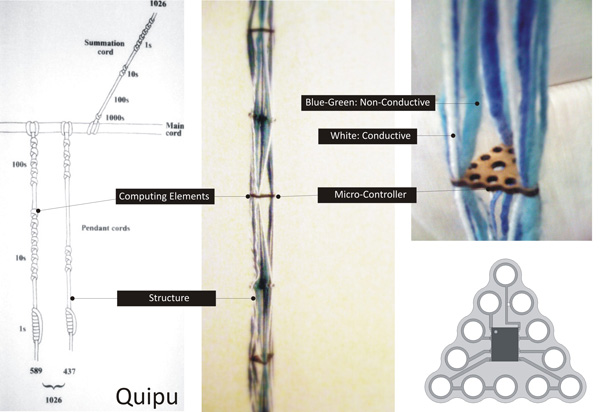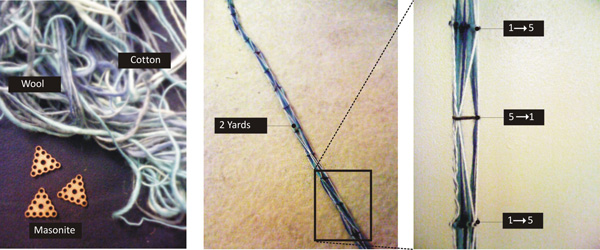| « Previous: student work sample | Next: Return to Assignment 4 description » |
By Rizal Muslimin

Digital Quipu: inspiration and design. (Left image (c) Mary Frame, from “Ancient Cloth...Ancient Code?” All rights reserved. This content is excluded from our Creative Commons license. For more information, see http://ocw.mit.edu/fairuse.)
My yarn is highly inspired by Quipu, an ancient counting devices from the Inca Empire in which knotted string act as a number for record keeping and record communication purposes (census record, state storehouse inventories, etc). This project is essentially transforming the analog ‘quipu’ into a digital ‘quipu’ by substituting the knot with the PCB and the cord with conductive and non-conductive yarn. Here, the size is scaled up to three times than the original intention [9 mm in diameter].
Specification
In this 2 yards digital quipu, there are 12 yarns ‘knotted’ with 18 PCB’s with the rules: 1 -> 5 and 5 -> 1 to create a triangular composition. The rules can later be parameterized with other types of rhythm or composition (a-b-a-b / a-a-b-b / a-a-a-b, etc).

Design elements of digital quipu.

Close up view of the yarn.
Total Diameter: 3 cm in triangular shape
Total length: 1.825 meters .
Wool fiber length: ~300 millimeters | twist direction: Z - 3 turns per inch | diameter: 3000 ~ 5000
Cotton fiber length: ~300 millimeters | twist direction: S ~2 turns per inch | diameter : 5.5 sts to 1 In
PCB: 4.19 cm2 | 3 for Positive Pin, 3 for Negative Pin, and 6 for MOSI, MISO, RESET and SCK pins
Special thanks to Ayu for helping me out.
| « Previous: student work sample | Next: Return to Assignment 4 description » |
